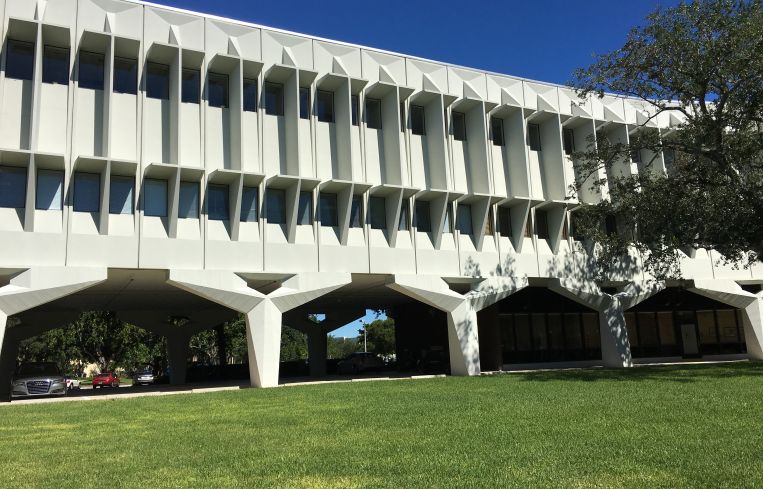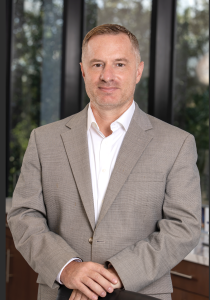How to Create a Technology Hub for the New Future of Office
By Michael Perrette September 21, 2022 10:06 am
reprints
A collection of beautiful but neglected historic buildings on Brooklyn’s waterfront were crying out for a new purpose 10 years ago. They had suffered considerably — first from divestment, then from Superstorm Sandy.
Following a $450 million redevelopment and adaptive reuse program, these buildings, comprising 6.5 million square feet, became Industry City, a neighborhood destination packed with retail, dining, amenities, art and culture.
Industry City was my professional home for four years, where I helped to build not only one of the foremost examples of Brooklyn’s active tech and “maker” culture but also a testament to the possibilities of thoughtful adaptive reuse.
In 2018, when Florida’s largest office landlord CP Group acquired 5000 T-Rex Avenue in Boca Raton, the once iconic IBM HQ had been suffering from decades of neglect, much like Industry City.
The birthplace of the personal computer, a sprawling building designed by Brutalist architect Marcel Breuer, had devolved into a vast, poorly maintained repository of Class C office space. The building’s tenants — most of them back-office — occupied only two-thirds of the building. The interiors were pure 1980s, with worn carpets, low ceilings and dim lighting. The only amenity? Ample parking.

Fast-forward to the present, and the gleaming white hexagonal building renamed Boca Raton Innovation Campus (BRiC) is almost fully occupied. BRiC’s 1.7 million square feet and 123 acres are currently home to 18 national headquarters and 19 regional offices.
What changed? We rebranded, repositioned, renovated and amenitized the campus to attract and retain today’s workforce.
Now that remote work has reduced the need for office space, we believe our approach is what it takes to attract employees back to their desks. The division between work and life has blurred. The owners who do not provide the amenities that address this shift will be stuck with big vacancies.
To date, much of our work has been focused on building a team to support BRiC’s tenant needs, addressing deferred maintenance, and installing amenities to provide conveniences for our tenants that they cannot get inside a typical office building. We have also replaced and upgraded chillers, elevators, generators and transformers to support our 10-megawatt generator plant — which can keep all 1.7 million square feet running for two weeks without refueling.
If municipal government authorities approve CP Group’s proposed master plan, the campus will be transformed over the next decade into a live-work-play environment, fully open to the public and incorporating residential and hospitality components.
The goal? To create a Class A office experience on par with what the tech giants such as Google or Facebook offer, but accessible to smaller technology and R&D-minded companies, to resurrect the concept of Boca Raton as “Silicon Beach” to surpass even IBM’s vision back in the day.
Our plans include cutting through part of the building to create a grand main entrance to the campus and improve vehicle circulation. Even as demolition and reconstruction are scheduled through 2023, the rest of the building will remain fully operational.
Construction has begun on a food hall and a 1,000-seat event space, which will become available to tenants upon completion. One thing I learned while at Industry City: Staying open on nights and weekends was critical to success. If rezoning allows opening to the public seven days a week and outside business hours, the hall will be able to host large-scale meetings, galas, the state science fair and TedXBocaRaton.
In the past, people parked, entered the building through the door nearest to their place of work, left by the same door at the end of the day, and drove home. Now, the amenities scattered throughout encourage employees to explore, while curated events and art displays, including an NFT exhibit, encourage them to meet and mingle.
We have created an outdoor patio connected to a coffee shop where people can eat, meet or use the powerful outdoor Wi-Fi to do some focused work. There are also walking trails. As part of the next phase, which is contingent on municipal approval, we plan to add more amenities: a grocery store, medical offices, retail and a live entertainment venue.
Once our tech-minded tenants enjoy the benefits and amenities of a micro-city, we expect it to create a positive network effect that will nurture a tech ecosystem reaching beyond the boundaries of BRiC’s 123 acres.
Michael Perrette is general manager at CP Group, owner-operator for Boca Raton Innovation Campus. He previously served as director of operations at Industry City.

![Spanish-language social distancing safety sticker on a concrete footpath stating 'Espere aquí' [Wait here]](https://commercialobserver.com/wp-content/uploads/sites/3/2026/02/footprints-RF-GettyImages-1291244648-WEB.jpg?quality=80&w=355&h=285&crop=1)

